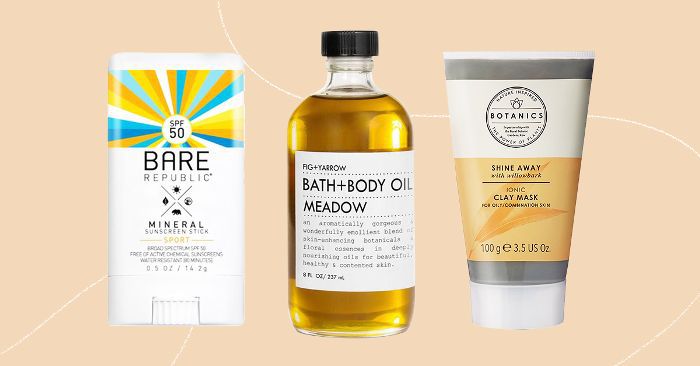Turmeric Can Help Tackle Dandruff and Hair Loss—Here's How

Turmeric may be associated with lattes and curry, but it’s just as good for your hair as it is for your palate. The bright yellow spice is chock full of antioxidants and anti-inflammatory components, which explains why turmeric has been found in beauty treatments for centuries worldwide.
A staple in ayurvedic medicine, turmeric has been used in India for at least 6,000 years for everything from a cooking spice to medicine to perfume to beauty. Thanks to trade across Asia, by 800 AD, it was widely used across the continent, particularly in China and Africa. Turmeric’s healing powers have been known for years, and it’s still regarded as a potent ingredient. Today, the antioxidant is tapped to treat dandruff and hair loss, to name just two. Keep reading to learn all the benefits of turmeric for hair, as well as how to use it.
Turmeric for Hair
Type of ingredient: Anti-inflammatory and antioxidant.
Main benefits: Treats dandruff, helps with hair loss, and is antibacterial.
Who should use it? Anyone looking for a hair growth boost, to keep their scalp healthy, or to treat dandruff.
How often can you use it? As often as needed.
Works well with: When using turmeric to treat dandruff, pair it with soothing and hydrating ingredients, such as olive oil.
Don’t use with: If you are taking turmeric orally, it’s important not to pair it with medications that are known to slow blood clotting, such as aspirin and ibuprofen. Turmeric naturally may slow down blood clotting, so combining it with these medications can cause internal bruising and bleeding.
What is Turmeric?
Part of the ginger family, it has been used for thousands of years for its medicinal properties. “Turmeric is a flowering plant with roots that are a vibrant yellow color due to a chemical called curcumin,” explains Dendy Engelman MD, FACMS, FAAD, a board-certified cosmetic dermatologist and Mohs surgeon at Shafer Clinic Fifth Avenue. “Because of curcumin, turmeric has anti-inflammatory, anti-oxidative, antibacterial, and anti-neoplastic (anti-cancer) properties. It is sometimes used in skincare, haircare, and cosmetic products for its health benefits and bright color.”
Of course, turmeric has benefits beyond beauty. “Turmeric’s main purpose in the 21st century is as a powerful anti-inflammatory herb,” says William Gaunitz, WTS, a certified trichologist and the founder of Advanced Trichology. “The chemical compound curcumin has been clinically shown to have benefits on cardiovascular health and proven reduction of inflammation systemically. It has been used for thousands of years for its medicinal properties and a spice [in] traditional southeastern Asian cuisine.”
Benefits of Turmeric for Hair
“Turmeric does have benefits for your hair because of its anti-inflammatory properties,” Gaunitz says. Its range of perks make turmeric a versatile ingredient for hair. You can find it in a range of hair products, from shampoos to conditioners, creams, masks, and even oils. By applying turmeric to your strands, you might experience a slew of its advantages, such as:
Prevents hair loss: Turmeric’s anti-inflammatory powers are a major boon to thinning hair, as it may stimulate growth. “Most hair loss is caused at least on some level due to inflammation,” Gaunitz says. “Reducing inflammation, in turn, reduces the impact of pattern hair loss or directly inflammatory hair loss on the scalp and hair follicles.”
Fights dandruff: “When used in hair, turmeric’s anti-inflammatory and antibacterial benefits can help with dandruff,” Engelman says. “When dandruff is left untreated, it can eventually lead to hair loss. Treating the hair with turmeric can keep the scalp healthy, which is a key component in healthy hair and new hair growth.”
Controls oil: “Turmeric is great for treating oily hair and scalps due to its anti-inflammatory and anti-microbial properties,” Engelman says. Those anti-microbial properties stop the growth of microorganisms, which oily scalps are prone to.
Improves scalp health: Turmeric’s anti-inflammatory benefits give an overall boost to the health of your scalp. “The healing and anti-inflammatory properties of turmeric naturally help with irritation of the scalp—unlike other products that do this by adding artificial ingredients,” Engelman says. “Turmeric is a great natural addition for a healthy scalp and hair.”
Treats eczema: Turmeric has plenty of effects that help it soothe eczema, including its antioxidant, anti-inflammatory, and antimicrobial properties. That also makes it great at minimizing atopic dermatitis.
Provides antioxidants: Free radicals can wreak havoc on your hair, scalp, and complexion, but one of the many reasons antioxidants are so loved is because they fight them off. As a result, hair follicles are protected from damage by harmful molecules.
Hair Type Consideration
Our experts agree that turmeric can give any hair type a boost. “However, if you have an inflammatory scalp condition, you must make sure that you are tracking your progress during the use of turmeric,” Gaunitz says. “In some cases, I’ve seen turmeric aggravate inflammatory scalp conditions that are caused by allergies or chemical exposure that is ongoing. The reason for that is turmeric is actually enhancing the immune response, which ultimately is causing hair loss. These are rare conditions, though.”
How to Use Turmeric for Hair

Navitas Organics
Organic Turmeric Powder
$10
An excellent way to apply turmeric to the hair is through a mask. “A great moisturizing DIY turmeric mask can easily be made by mixing equal parts olive oil and turmeric,” Engelman says. “You may also add a small amount of honey to make the mask more moisturizing. Apply the mask evenly and let it sit for fifteen to twenty minutes, allowing the ingredients to soak into the hair. Finally, rinse and cleanse your hair with your favorite shampoo and conditioner.” Engelman also recommends combining turmeric with essential oils like lavender to create a soothing scalp treatment.
In addition to being applied topically, turmeric can be taken as a supplement, delivering hair and skin perks. “The best way to use turmeric for your hair is to take it internally so that it can be processed in your gut and have a systemic reduction of inflammation,” Gaunitz says. “Turmeric can be used daily when you follow the normal recommendations for systemic use. Depending on the concentration of turmeric, you should take between 500 and up to 2000 mg per day.” Just remember that if you’re taking turmeric orally, don’t combine it with medications that can slow blood clotting, including aspirin and ibuprofen.
These Turmeric Supplements Are Ace at Reducing Inflammation








